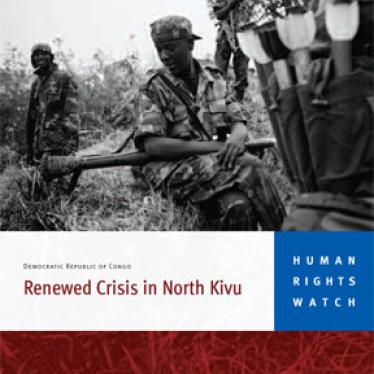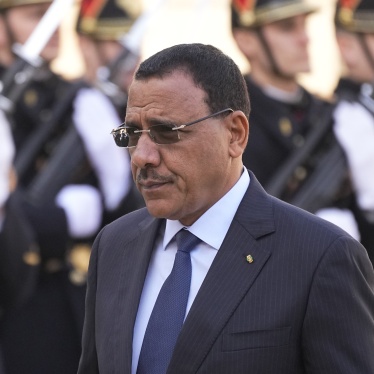(Brussels) - Congolese officials and UN peacekeepers should take swift action to enforce the International Criminal Court’s (ICC) arrest warrant against a rebel leader accused of forcibly conscripting child soldiers and of other abuses.
The ICC on April 29 revealed the unsealing of the arrest warrant against Bosco Ntaganda, charging him with the enlistment, conscription, and active use of children in 2002-2003 during the conflict in the northeastern district of Ituri when he was chief of military operations for the ethnic Hema militia group, the Union of Congolese Patriots (UPC). Ntaganda is now the military chief of staff of the National Congress for the Defense of the People (CNDP) in the Congo, a position he took after leaving the UPC following internal conflicts in 2006.
Led by Laurent Nkunda, the CNDP is considered responsible for serious abuses against civilians in the North Kivu province of eastern Congo. But on January 23, 2008, the Congolese government signed a peace agreement in Goma, North Kivu, with 22 armed groups, including the CNDP. Under its terms all parties agreed to an immediate ceasefire and committed to respecting international human rights law.
“If Laurent Nkunda is truly committed to the Goma peace agreement, then he should immediately deliver Ntaganda to the international court,” said Anneke Van Woudenberg, senior researcher at Human Rights Watch’s Africa division. “Now is the time for Nkunda to put his professed commitment to human rights into action.”
Ntaganda is the fourth Congolese rebel leader sought by the ICC for war crimes. Three other Congolese defendants – Thomas Lubanga, Germain Katanga, and Mathieu Ngudjolo – are already in ICC custody.
Special envoys from the African Union, the European Union, the United States, the United Nations, and the International Conference on the Great Lakes Region played a vital role in brokering the Goma peace agreement. A number of these diplomats meet regularly with CNDP representatives as part of the peace process. Human Rights Watch urged them to use their influence to pressure CNDP officials to swiftly hand over Ntaganda to the ICC.
The ICC issued the arrest warrant against Ntaganda on August 22 2006, but only made it public on April 28, 2008. Congolese authorities and officials in the United Nations Mission in the Congo (MONUC) have known of its existence and contents since it was first issued, but since Ntaganda remains active in a rebel group, have found it difficult to take action to arrest him.
“An alleged war criminal wanted by the world’s top court should not be allowed to walk free in the Congo,” said Van Woudenberg. “If Nkunda does not hand him over to the ICC, UN peacekeepers should take action to arrest Ntaganda as soon as possible.”
The crimes which Ntaganda is alleged to have committed occurred when he was the chief of military operations of the UPC. He was a close associate of Thomas Lubanga Dyilo, the former head of the UPC, whom the ICC has also charged with the enlistment, conscription, and active use of children during the same period. Lubanga’s trial is due to begin in The Hague later this year.
Human Rights Watch has collected hundreds of testimonies from survivors documenting serious crimes allegedly committed by the UPC during Lubanga and Ntaganda’s leadership. These crimes include massacres against particular ethnic groups – especially those from the Lendu ethnic group - murder, torture, and rape. More recently, Human Rights Watch has documented crimes allegedly committed by CNDP forces during the time when Ntaganda was military chief of staff.
“Ntaganda has a track record of inflicting unbearable suffering on civilians in Eastern Congo,” said Van Woudenberg. “The ICC should charge him with the full range of the crimes for which he is responsible, allowing his victims the justice they desperately seek.”
Human Rights Watch research also indicates that there was support from senior political and military officials in Kinshasa as well as in Uganda and Rwanda to the UPC and other militias operating in Ituri. Human Right Watch also has consistently urged the prosecutor to investigate these senior officials for their role in the crimes committed in Ituri.
“Ending the culture of impunity requires the ICC’s prosecutor to go after those senior individuals in Kinshasa, Kigali, and Kampala who armed and supported the armed groups in Ituri,” said Van Woudenberg. “Only then will justice be done.”
Background
Bosco Ntaganda is a Congolese Tutsi who fought with the Rwandan Patriotic Army in the early 1990s and assisted in the overthrow of the Rwandan government at the time of the genocide in 1994.
Ntaganda eventually became the chief of military operations of the Forces Patriotiques pour la libération du Congo (FPLC), the military wing of the UPC in Ituri. In this capacity, he was involved in numerous massacres and other serious human rights abuses. In the town of Songolo in August 2002, UPC combatants under Ntaganda’s command surrounded the town and went house-to-house killing Lendu and Ngiti civilians with firearms, machetes, or spears. From August 2002 to March 2003, Ntaganda participated in hunting down, arresting, and torturing at least 100 members of the Lendu ethnic group and other opponents in Bunia in what many described as a brutal “man hunt.”
In November 2002, Ntaganda also led UPC troops in attacks on the gold mining town of Mongbwalu where at least 800 civilians were slaughtered on ethnic basis. One witness who fled the town told Human Rights Watch, “If you were Lendu, you would be exterminated.” According to UN peacekeepers, Bosco’s UPC was responsible for killing a Kenyan UN peacekeeper in January 2004 and for kidnapping a Moroccan peacekeeper later that year.
In October 2003, the UPC president Lubanga went to Kinshasa where he was kept under nominal house arrest by the Congolese authorities; Ntaganda took over as acting head of the UPC in Bunia and was in regular phone contact with Lubanga. In January 2005, in a failed attempt to end the conflict in Ituri, Congolese authorities appointed Ntaganda to the position of general in the newly established Congolese army, though Ntaganda refused to take up the post. He was placed on the UN sanctions list in November 2005 for breaching a UN arms embargo. In March 2006, Lubanga was taken into ICC custody and transferred to The Hague, where he is currently awaiting trial.
Sometime in 2006, following alleged differences within the UPC, Ntaganda left Ituri for his home region of North Kivu and joined Laurent Nkunda’s rebel group, the CNDP. Today, he is the military chief of staff of the CNDP, a group alleged to have committed numerous human rights abuses, including recruitment of child soldiers, killing of civilians, and sexual violence.







